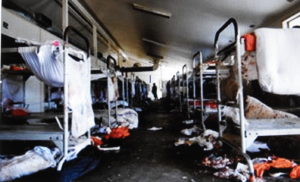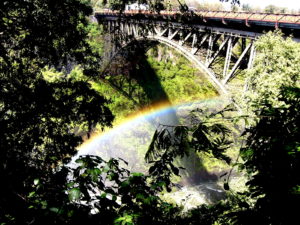04 Sep Zimbabwe — In Mugabe’s Slams
In the spring of ’08 while Hillary Clinton and Barrack Obama were duking it out in the presidential primaries, Peggy and I visited a game park in South Africa. There we met a British newspaper reporter named Steve Bevan, his wife and two sons. The grownups got to talking, Steve asked my opinion about various aspects of American politics and, since I have lots of opinions about all sorts of aspects of American politics, some obvious, some subtle, a whole lot that are obscure, plenty that I’d never noticed before, and way too many that turn out to be contradictory, I was charmed.
After a bit, the fascination of listening to me wore off, at least as far as Steve’s wife and sons were concerned, and they drifted away to more profitable pursuits, the sons to check out the action on their individual handheld Play Station 3’s and the wife to remind them that, “Hey, we’re in one of the great game parks on the planet, here. You might want to look around a bit. There could be animals, you know.”
Steve didn’t say much about himself and, looking back, I wish I’d asked. At one point he mentioned a few things about the Zimbabwean jail he’d just gotten out of, then pretty much let the subject drop.
When I got home I began to wonder what I’d missed by spending so much time rattling on about my own opinions, many of which I already knew, and not asking Steve more about that Zimbabwean jail and why he was in it. And how he got out. And what it was like. So I googled him.
What I learned was that he’d been rousted from his hotel by about forty cops from the scary-sounding Law and Order Division of the Zimbabwe Republic Police, and hauled off to the Central Harare Police Station on suspicion of “Practicing Journalism.” That was the crime Steve was suspected of committing: Practicing Journalism.
It wasn’t that it was a false arrest, the cops were right. He had been practicing journalism. The London Telegraph had sent him to Harare thirty-six hours earlier to try and get a line on when, if ever, Robert Mugabe was going to release the results of the presidential election that had been held weeks earlier.
The Central Harare Police Station, né the Central Salisbury Police Station, is a grim, Orwellian fortress where, in the Sixties and the Seventies, the Old Regime used to disappear black revolutionaries. Conditions inside were pretty much what you imagine,

at least in the generally-accepted-standards-of-cleanliness department. Bevan spent a few long days inside, and a few much longer nights, before being let go.
The proximate cause of being let go was his lawyer’s discovery that Practicing Journalism is no longer against the law in Zimbabwe. Now, the crime is “Holding Oneself out as an Accredited Journalist,” and the prosecutor had charged him with the wrong thing. So, in the proudest tradition of our shared common law heritage, he skated on a technicality.
It wasn’t the sort of technicality that was going to keep him out for long, though. All the prosecutor had to do was re-file the charges under the right law, and Steve would be headed back to the slams – this time, probably forever.
So, in the time-honored way of reporters on the lam, he tried not to do what the police expected. Instead of heading for the airport and going home, he put on a pair of Bermuda shorts, beat feet down to Victoria Falls, made himself look as casual as he could, and scooted across the iron bridge to freedom in Zambia.

What grabbed me about his story, other than the fact that I’d had no idea anybody ever got sprung from a totalitarian prison on a technicality, was the topic of conversation inside the prison. At least, among the guards.
At a time when the inflation rate of the Zim dollar was running at 118,000% per year and gaining speed; when there weren’t any goods to be had on any shelves for any currency, no matter how hard; at a time when Mugabe had clearly lost his bid for reelection but showed no signs of giving up power and the country seemed on the brink of flying into factional violence; at a time when the president of Botswana was a couple of days away from casting Zimbabwe into outer darkness by cutting off bulk-fuel shipments; at a time when the Southern Africa Development Commission was about to say naughty-naughty to the first revolutionary leader in history it had ever said naughty-naughty to; at a time when millions of fellow citizens were fleeing to Zambia and Mozambique and Botswana and South Africa as fast as they could slip under the barbed wire, the hot topic in the Central Harare Police Station, the topic among the thugs whose job it was to beat the crap out of the prisoners, was . . . the results of the Pennsylvania primary.
“People all over the world who have no power in their own politics,” Steve told me, “feel like they can participate in yours. That is something that should make you Yanks very proud.”


No Comments